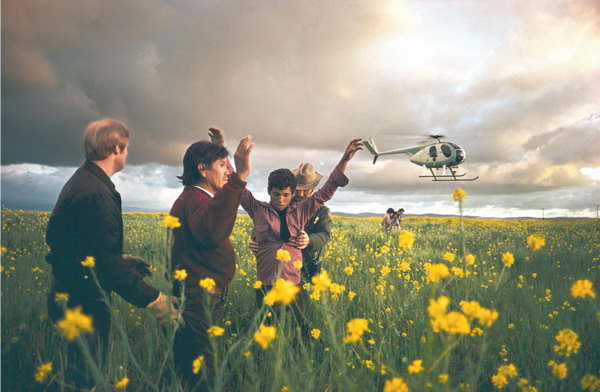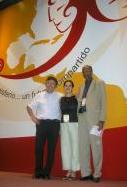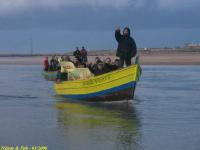 ALLIANCE FOR A RESPONSIBLE, PLURAL, AND UNITED WORLD
ALLIANCE FOR A RESPONSIBLE, PLURAL, AND UNITED WORLD ALLIANCE FOR A RESPONSIBLE, PLURAL, AND UNITED WORLD
ALLIANCE FOR A RESPONSIBLE, PLURAL, AND UNITED WORLD Making History on the Road to the World Alliance of Migrants
Making History on the Road to the World Alliance of MigrantsIn an unprecedented event, about 400 migrants from almost every country in the three Americas, from Alaska to Tierra del Fuego (literally!), came together in the city of Morelia, in the Mexican state of Michoacán, to listen to one another, learn from each other, and look into the mirror of their different experiences. They were joined by nearly 200 representatives of migrant communities from Africa and Europe, NGOs, academic institutions and Mexican and U.S. authorities. This was not just one more meeting on migration, it was also a giant step toward a great World Alliance of Migrants.
The venue for this event was the lovely city of Morelia, declared World Heritage by the United Nations for its historic center and the untouched beauty of its colonial architecture, which when traveled through, constitutes a virtual journey into the past. Morelia was not chosen by chance. Michoacán, where it lies, is historically the state that has generated the most Mexican emigrants to the United States, and they currently contribute 13% of total remittances to the country, a paradigmatic example of a growing global reality involving almost every country and about 250 million people. The state of Michoacán, taking the lead in this domain, has extended local political participation to its emigrants by granting them the right to vote in state elections. It therefore comes as no surprise that the state authorities and the many clubs of migrants or their relatives were most fraternal and efficient hosts and turned Morelia into a significant epicenter of the building process of the migrant social subject.
Unity in diversity

Migrants are a consubstantial part of the new global realities and also an emblematic expression of their contradictions and challenges. To all intents and purposes, they are changing the conception and experience of democracy and culture, they are the fountainhead for the construction of a new citizenship based on a growing multiple identity – bi-national, multinational, and finally universal. They are the creators of a new world for everyone, starting with those in their home, transit and destination countries, in whose lives they also play the part of double or multiple development agents, against every obstacle and all forms of incomprehension.
Making this a conscious process, guiding it deliberately, and spreading it is the embryonic task of the migrants themselves. Their unity, proposals and protagonistic action is the engine that fuels a new relationship and a new responsibility for the governments and civil societies of every country. To achieve this, the key is to join efforts, and dialog is the essential and indispensable starting point. For the migrant civil society of the South, the Summit was both the culmination of a long and rich previous stage, and the first step to activating a new stage in the long road to gain respect, justice and humanity for all forms of this human mobility and all its protagonists.
Beyond its important contributions to the thinking and the proposals, the Summit was crucial in building what is common to all and also includes the natural expression of differences: this was its essential achievement, the one most significantly filled with possibilities. Of course, a lot was said that has been said before and is sure to be said for much time to come, but what is new and vital is that now it has been said by the migrants themselves, thus confirming that yes, there is a common identity, and that it is based on their objective and legitimate differences. Unity and diversity viewed, not as opposed but complementary in a single movement, as moments of the same process, aspects of an indivisible whole, all of this made it possible to conjugate countless particular, necessarily specific experiences, constructively, into an already conscious and explicit common vision that opens the road to a common agenda. This was symbolized in particular by the presence and important contribution of African migrant-community representatives, who testified to the necessarily global vocation of this Latin American civil-society event, which is to build a new global civil governance. To succeed more rapidly and substantially in reaching the goal of unity in diversity, one of the conclusions of the collective thinking was the need to overcome the self-centeredness and contradictions generated by a variety of personal, group, national, ethnic, and thematic reasons.
Limitations
There were also limitations, contradictions and problems, all of which are inherent to any living, moving collective process. Even these, however, besides being in themselves proof that real progress was made, are experiences to think about and incentives to make adjustments, and they are therefore part of the positive balance of the event. There were questions regarding the method and the program, to be corrected to avoid redundancy and make the dynamics even more participatory: a more balanced presence of migrants from the South and from the North, the latter having been more numerous this time; and a pending debate as to how much and in what ways state representatives, members of big private companies, and academics should be involved, their presence on this occasion having generated criticism, although no one failed to recognize it as a necessary means to achieve incidence, which is everyone’s objective. These are only some of the many aspects that need to be worked on for greater definition or adjustment.
Thematic wealth
The rich contributions in the experiences, thinking and proposals debated for three days – including the wonderful socio-cultural events – are literally countless. They included: the need to finish with the exclusion-based neo-liberal model in evident crisis by raising socially and environmentally sustainable development alternatives; the urgency of defending the Amazon, which is the heart of the future Latin America and is threatened by the voracity of multinational corporations and U.S. military occupation; the demand for multilateral migration policies centered on Human Rights, especially to free undocumented persons from the shadows and from fear, with special consideration for women, children, native Indians, African descendants, refugees, and displaced persons; the project of drawing up a “Charter of Migrants”, a universal document produced by migrants themselves; remittances; culture; borders; youth leadership; local development; the media; film production; a variety of many campaigns; and a long etcetera reflecting the abundance and density of the knowledge that was shared.
What next?
The Final Declaration of the event consisted of a mosaic: added to the Declaration of only the international organizing committee, were all the others that arose. This did not satisfy all those who attended, in some cases because of their conception of the migrants social movement, in others rather for reasons of methodology to make larger participation viable.

The issue here is to find a balance between what is ideal – the relatively easy position of demanding “everything,” the comprehensiveness of the demands, sometimes somewhat simplistic – and what is really possible: what in fact can be achieved in accordance with objective conditions. This implies coming up with a serious, quality proposal resulting from a lot of work. Both sides of the equation are necessary, though difficult.
From that point on, it was agreed to stay on the path thus taken through to a future Second Latin American Summit and a very important European-African Summit, probably in Marseilles. The possibility was also mentioned of a South American Summit to reinforce the Latin American movement with the four million intra-regional migrants of the South Cone. All of this is meant to converge on the horizon of the World Social Migration Forums already in progress.
Though walls will not stop it, raids will not discourage it, and deportations will not end it, the incomprehension and negligence of governments and broad sectors of the population still makes of migration an unnecessary wreckage of human dignity and happiness. And even though migration bears a drama in its home, transit or destination countries, it also bears quantities of great wealth, full of opportunities and hope. The construction of a great World Alliance of Migrants for a New Global Civil Governance, of which this Summit is a building block, is part of the perfectly possible, absolutely necessary road to make that hope come true. In this effort, migrants continue to offer the world the wonderful possibility of all roads.
URL : www.alliance21.org/2003/article2446.html
PUBLICATION DATE: 5 June 2007